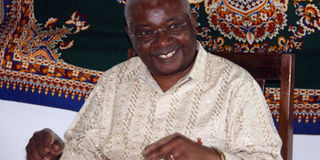Campaigns and intrigues intensify as Mozambique, Botswana polls loom

Mozambique's President Armando Guebuza speaks in Sofala on October 24, 2013. PHOTO | FERHAT MOMADE | AFP
What you need to know:
- In Mozambique, where national and presidential elections are due on October 15, polls will be held after a prolonged period of anxiety following armed clashes between the government of President Armando Guebuza and guerrillas from the country’s main opposition party.
- Renamo has been the main opposition party in parliament, but support for Dhlakama has reportedly been waning in presidential elections, dropping from a peak of 48 per cent in 1999 to 17 per cent in 2009.
After a rather lengthy hiatus on the African polling scene, a new period of frantic political activity is picking pace in Southern Africa, where national elections are looming in Mozambique and Botswana.
In Mozambique, where national and presidential elections are due on October 15, polls will be held after a prolonged period of anxiety following armed clashes between the government of President Armando Guebuza and guerrillas from the country’s main opposition party.
Past instability aside, the coast seems to be clear for the time being following a ceasefire pact signed on August 24 between the Frelimo government and the opposition Renamo party. Soon after independence from Portugal, Renamo waged a 16-year guerrilla campaign that resulted in the deaths of close to a million people before a peace deal was signed in 1992, but unfortunately did not hold for long.
In a resurgence of hostilities, President Guebuza and his government have in recent years been pitted against guerrillas led by controversial opposition figure Afonso Dhlakama, whose Renamo party has for long been a thorn in the flesh of the government.
Earlier misgivings about the possibility of conflict-free elections being held in the country and ushering in the likelihood of lasting peace have however dissipated in recent times.
There is therefore mounting hope for a new era in Mozambique, which is also on the threshold of a major economic revival following the discovery of massive natural resources, particularly oil and gas.
The prospects for peace and stability come after a lull in hostilities between the government of President Guebuza and the formerly obstinate and implacable Dhlakama, who has been in hiding for some time, and whose armed insurgents have intensified attacks on government and civilian targets in recent times.
The recent deal was expected to see Renamo guerrillas integrated into the national police and army after handing over their weapons in a process that is to be overseen by an “international force”, and whose composition is yet to be announced. The insurgents will also be granted amnesty for crimes committed in the most recent conflicts.
Following the recent truce, which is widely expected to hold this time around, the Renamo opposition party reportedly hopes to keep its political aspirations alive ahead of the October elections, the results notwithstanding.
MAIN OPPOSITION PARTY
Renamo has been the main opposition party in parliament, but support for Dhlakama has reportedly been waning in presidential elections, dropping from a peak of 48 per cent in 1999 to 17 per cent in 2009.
Much as hopes for durable peace and stability in Mozambique have been welcomed all round, there has been some scepticism about the feasibility of the recent accord, with some observers pointing out that Dhlakama failed to come out of hiding to sign it. On the positive side, he is expected to hold a meeting with President Guebuza to rubber stamp the ceasefire at a later date.
In the meantime, October 24 will also see Botswana holding elections and the country is reportedly in a frenzy as campaigns intensify. The polls will be held following the dissolution of the country’s 10th parliament on August 29 and the declaration of a public holiday on election day to allow as many Batswana as possible to cast their ballots.
As the campaigns pick up, there has been mounting pre-election drama and intrigue, and events took a new turn following the recent mysterious death of opposition leader Gomolemo Motswaledi.
The death on July 30 of the vocal leader of the Umbrella for Democratic Change and Gaborone Central parliamentary aspirant sparked allegations he may have been assassinated by pro-government agents.





